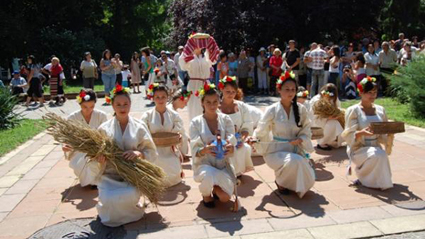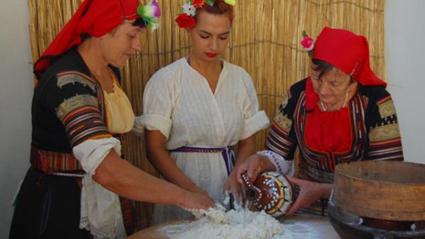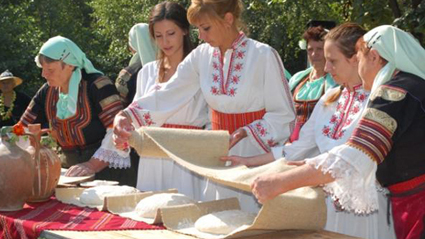While on Assumption Day thousands of Orthodox Christians and Catholics flock to church to pray, people in Kyustendil honour Panagia – another name for the Virgin Mary. Panagia is the name given to the ritual raising and breaking of bread. Panagia is a pendant depicting the Virgin Mary, it is also a name given to churches, fortresses and towns.
 Panagia brings religious and folklore tradition in one. The ritual is performed in churches and chapels bearing the name of the Mother of God. One day before the religious fete, girls clad in national costume, sickles in hand bring in the ears of wheat, singing harvest songs. Women make loaves the way their grandmothers once did – they start before sunup, use crystal clear water from the well and bake them in their farmhouse ovens. Rituals connected with bread very much resemble the Holy Sacrament – the wheat is thurified and the woman, the embodiment of the mother passes her “knowledge” over to the girls.
Panagia brings religious and folklore tradition in one. The ritual is performed in churches and chapels bearing the name of the Mother of God. One day before the religious fete, girls clad in national costume, sickles in hand bring in the ears of wheat, singing harvest songs. Women make loaves the way their grandmothers once did – they start before sunup, use crystal clear water from the well and bake them in their farmhouse ovens. Rituals connected with bread very much resemble the Holy Sacrament – the wheat is thurified and the woman, the embodiment of the mother passes her “knowledge” over to the girls.
 The ritual of kneading Assumption Day bread will this year be performed in Piperkov Chiflik village. And in the area around the St. Ivan of Rila church, the women will be teaching young girls how to make bread as it was once made. The loaves will be baked in a flat clay baking dish called podnitsa as this has been done since time immemorial and will then be put on display in front of the Assumption church in Kyustendil. It is there that Panagia – the ritual raising of bread will be performed.
The ritual of kneading Assumption Day bread will this year be performed in Piperkov Chiflik village. And in the area around the St. Ivan of Rila church, the women will be teaching young girls how to make bread as it was once made. The loaves will be baked in a flat clay baking dish called podnitsa as this has been done since time immemorial and will then be put on display in front of the Assumption church in Kyustendil. It is there that Panagia – the ritual raising of bread will be performed.
 “The bread baked on feast days is different,” says Lyubliana Nacheva, expert at the Culture and Spiritual Development department at Kyustendil municipality. “Of course, the things that go into its making are no different – flour, leaven, water, salt. What is more important, however, are the semantics people used to imbue bread with. The process of making feast-day bread is connected with spiritual purification, with the prayer the mother says before starting, with the lighting of candles, with the thurification. And it all starts with the blessing of the water, the sign of the cross. This is done on Assumption Day, at Easter and Christmas, on St. George’s Day and other Christian holidays.”
“The bread baked on feast days is different,” says Lyubliana Nacheva, expert at the Culture and Spiritual Development department at Kyustendil municipality. “Of course, the things that go into its making are no different – flour, leaven, water, salt. What is more important, however, are the semantics people used to imbue bread with. The process of making feast-day bread is connected with spiritual purification, with the prayer the mother says before starting, with the lighting of candles, with the thurification. And it all starts with the blessing of the water, the sign of the cross. This is done on Assumption Day, at Easter and Christmas, on St. George’s Day and other Christian holidays.”
Kneading the feast-day bread begins with a prayer for good will, it is then decorated with ornaments made of dough depicting different important aspects of life and is then taken to church in gratitude to the Virgin Mary.
“Making bread for Assumption Day is typical of Kyustendil, all the more so that the church there bears the name of the Holy Mother of God,” says Lyubliana Nacheva. “On this day people bring their own bread to be thurified at a church service for each family and each individual. As to the cultural forum called Panagia it was created eight years ago. The idea is to show what Christian culture is all about, to demonstrate the authentic way of life and ethnography.”
English version: Milena Daynova
Photos: kultura-kn.infoThe Bulgarian folklore dance group Vito Horo from Perth will take part in the multicultural women’s festival Harmony of Colours, taking place tonight in the Australian city, the Bulgarian association Rodina has announced. Besides the Bulgarian..
The resort towns along Bulgaria’s Black Sea coast can be broadly categorized into two types: modern ones, characterized by their lively and colorful streets, and port cities with a rich history. Various settlers have passed through these port towns,..
The 14th World Folklore Championship, "World Folk 2024" , starts today and runs until August 30 at three locations on Bulgaria's Black Sea coast: Nessebar, Sunny Beach and Sveti Vlas. The event kicks off tonight at the Jana Chimbuleva Amphitheatre in the..

+359 2 9336 661
